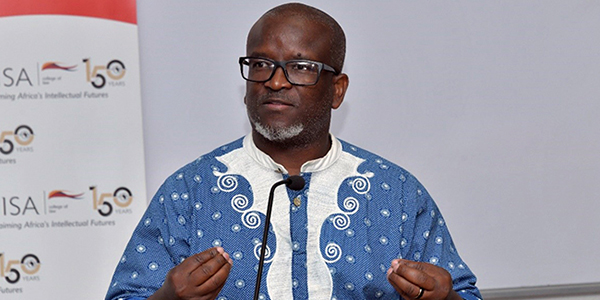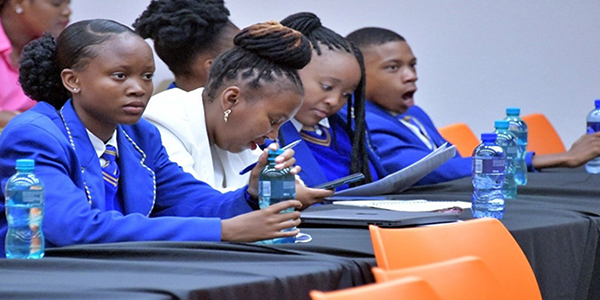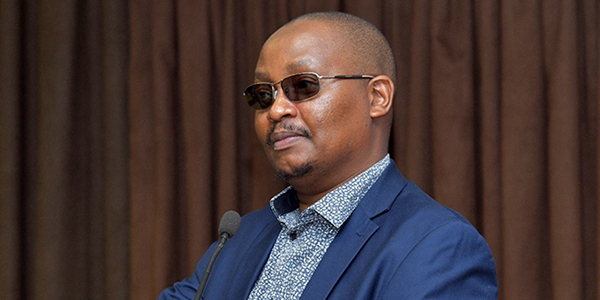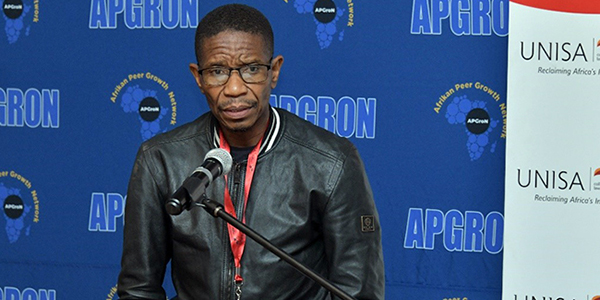College of Law
The 3rd Annual Unisa-APGroN Conference was a resounding success
Unisa's College of Law (CLAW) partnered with the Afrikan Peer Growth Network (APGroN) to deliver this year's iteration of the international conference, which focuses on Africa's development and transformation. The third Annual Unisa-APGroN Conference was a success, judging from several notable achievements. The conference was a joint project of the School of Law (under the Acting Director, Prof Angelo Dube), the School of Criminal Justice (under Dr Lebogang Morodi) and the Office of Strategic Projects (under Dr Lindelwa Mhlongo).

Zibuse Kunene, Life Coach
Among the participants who attended this year's event were scholars from various countries across the African continent, including Nigeria, Kenya and the island nation of Mauritius. From further afield, delegates hailed from the United Kingdom, the United States and Switzerland. Learners from Botebo-Tsebo Secondary in Sebokeng were also invited to attend, further enriching the already broad representation at the 2023 conference and ensuring the cross-fertilisation of ideas and insights. Presentations revolved around this year's theme, "The Intersection of Justice and Decoloniality – Strategies for the Transformative and Reformative Agenda". The theme accommodated papers on different sub-themes, including the following:
- Pre-colonial and contemporary South-South relations
- Civil society, identity, migration, spirituality, racism, and xenophobia
- The teaching of International Law in higher education
- Labour, transborder justice and post-apartheid South Africa
- Aerospace, maritime, defence and security
- The regulation of conflict in International Law
- Financial markets, banking and corporate governance

Learners from Botebo-Tsebo Secondary School
Reflections on abstracts
More than 50 abstracts were received on these wide-ranging sub-themes. The Unisa–APGroN conference committee accepted 40 submissions for presentation as papers during the event. After revision, those abstracts were published in a book of abstracts.
During the conference, capable programme directors took charge of the different breakaway groups, ensuring that each presenter adhered to the schedule and the timeframe allotted for their presentation, thereby facilitating the smooth running of the programme. Time was also set aside for reflection and discourse on the papers presented. Selected contributions were earmarked for publication in an edited book titled The Teaching of International Law in Africa. This work will bring together practitioners and teachers of International Law to reflect on current pedagogical approaches to the delivery of the subject in various African universities, as well as possible transformative and reformative approaches.

Prof Angelo Dube, Director, School of Law
Capacity building
Many conference activities focused on capacity building were aimed at junior and emerging scholars. They learnt more about research and publication practices, including writing for publication, converting a thesis into a publishable journal article, and developing an abstract and a research proposal. The life coach, Zibuse Kunene, advised junior and upcoming researchers on how to cope with the demands of the knowledge-generation environment. The college's designated librarian, Yegis Naidu, was also invited to address participants on the range of library tools available and the creation of research and ORCID IDs.
The capacity-building session ran parallel to a high-level panel discussion, generating significant participant interest. This year's central theme was "Centering International Humanitarian Law in the Main Discourse in Geopolitics Today" – as part of CLAW's project for "Mainstreaming Military Law in the Curriculum". This session brought together captains of industry, policy and lawmakers, and other stakeholders who brainstormed possible solutions to the contemporary and topical problems facing society regarding conflicts and peacemaking. This year's discussion focused on the conflicts in Mozambique, Swaziland and Palestine before branching out to the resurgence of coups in Africa and the deployment of the military to quell illegal gold mining (by so-called zama-zamas) in South Africa. These discussions proved highly informative.
This year's conference also welcomed the attendance of a group of learners from Botebo-Tsebo Secondary School in Sebokeng, in Vanderbijl Park. Most of the youngsters, accompanied by their teacher and mentor, Celimpilo Dladla, aspired to become lawyers and appreciated the opportunity to experience the workings of an academic conference. Their engaged participation in the deliberations bears testament to their generation's readiness to meet the demands of the tertiary education sector in the coming years. The learners' involvement underscores APGroN's approach to mentoring young adults in the law profession as part and parcel of its endeavours to offer a holistic support system to junior researchers and established scholars.

DR Lebogang Morodi, Director School of Criminal Justice
The Gala Dinner
The conference culminated in a gala dinner on the final day, during which Advocate Andries Moekoa delivered the keynote address. In what he termed a "call-to-action", he lauded CLAW and APGroN for providing a space for mentee networking and helping with research and publication practice for junior and emerging scholars. He emphasised the need to redress the current imbalance in knowledge production, where the African continent accounts for less than one per cent of all global research produced, before inviting the attendees to join the movement to place the African child at the centre of the knowledge-production economy.
As revealed during the conference, numerous papers presented at the 2022 conference have already been published in volume 48 of the South African Yearbook of International Law (SAYIL).
Over and above the envisaged book, to be published in collaboration with Unisa Press, selected high-quality papers will also be considered for publication in SAYIL, the Comparative and International Journal of Southern Africa, the Southern African Journal of Security, the Journal of Law, Society and Development, and the South African Mercantile Law Journal.
* By Prof Angelo Dube, Director, School of Law
Publish date: 2024/02/22

 Unisa co-hosts G20 community outreach in the Eastern Cape
Unisa co-hosts G20 community outreach in the Eastern Cape
 Unisans gain membership of prestigious science academies
Unisans gain membership of prestigious science academies
 Advocating for disability transformation through servant leadership
Advocating for disability transformation through servant leadership
 Unisa Press continues to illuminate the publishing space
Unisa Press continues to illuminate the publishing space